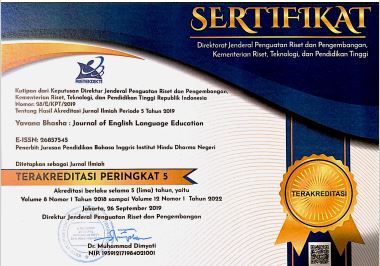SPEECH ACT AND POLITENESS TRATEGY USED BY PRE-SERVICE TEACHER IN ONLINE LEARNING IN SMA LAB UNDISKSHA
DOI:
https://doi.org/10.25078/yb.v4i2.540Keywords:
Online Learning, Politeness Strategy, Speech ActAbstract
Language is an essential tool that we use in our daily life. In general, language is used as a tool
to convey information. In using language, speakers must pay attention to the language used.
Language users should do this to avoid or minimize errors in conveying information to listeners. This
study aims to determine what types of speech acts and politeness strategies are used by pre-service
teachers when teaching online classes. This research is expected to provide an overview of how speech
acts and politeness strategies can affect educational activities. This research is a qualitative descriptive
study. This research was conducted using two steps. The researcher's first step is to observe how preservice
teachers use speech act and politeness strategies in online classes. Then the researcher will
conduct interviews with research subjects or pre-service teachers to verify the data that has been
observed. In conducting this research, the researcher used two theories as to the research foundation.
The first theory is Searle's theory of speech act types and Brown and Levinson's theory of politeness
strategies. The study found that if pre-service teachers use five types of speech acts, they are
representative, directive, commissive, expressive, and directive. This study also found that pre-service
teachers used more directive speech acts in teaching online classes than other types of speech acts. In
addition to the use of speech acts, this study also found that pre-service teachers also use four
politeness strategies in teaching online classes. The four types of politeness strategies are bald-onrecord,
positive politeness, negative politeness, and off-record.







